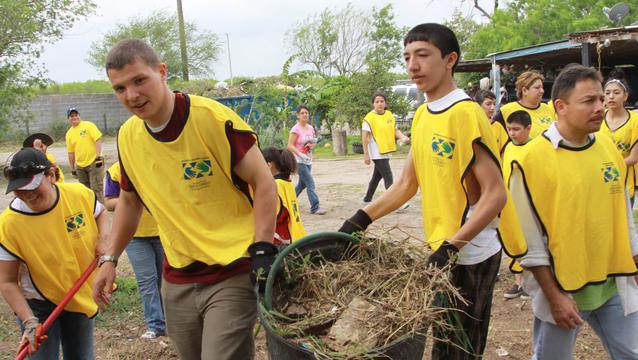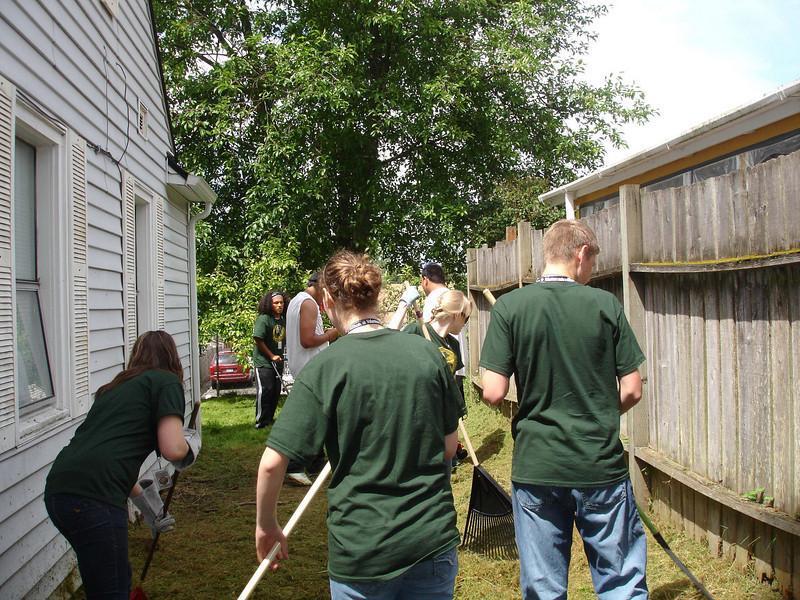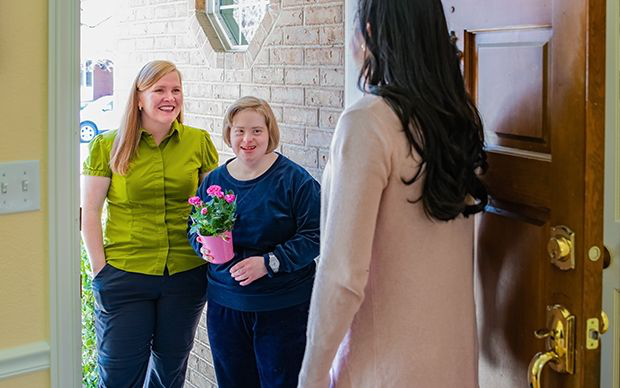Difference between revisions of "Template:Humanitarian Aid Updates"
m |
m |
||
| Line 65: | Line 65: | ||
Adriana, the communication director for the Montreal Quebec [[Stake]], summed up the willingness of members to serve by saying, "''We can make a difference in a person's life by following the example of our Lord Jesus Christ and reaching out—safely—to those in need; for we know well that it is 'by small and simple things that great things are brought to pass'''"(see [https://abn.churchofjesuschrist.org/study/scriptures/bofm/alma/37.6?lang=eng Alma 37:6]). In the words of [[King Benjamin]] from his timely sermon as recorded in the [[Book of Mormon]], "For behold, are we not all beggars? Do we not all depend upon the same Being, even God, for all the substance which we have, for both food and raiment, and for gold, and for silver, and for all the riches which we have of every kind?" (see [https://abn.churchofjesuschrist.org/study/scriptures/bofm/mosiah/4.19?lang=eng Mosiah 4:19]). | Adriana, the communication director for the Montreal Quebec [[Stake]], summed up the willingness of members to serve by saying, "''We can make a difference in a person's life by following the example of our Lord Jesus Christ and reaching out—safely—to those in need; for we know well that it is 'by small and simple things that great things are brought to pass'''"(see [https://abn.churchofjesuschrist.org/study/scriptures/bofm/alma/37.6?lang=eng Alma 37:6]). In the words of [[King Benjamin]] from his timely sermon as recorded in the [[Book of Mormon]], "For behold, are we not all beggars? Do we not all depend upon the same Being, even God, for all the substance which we have, for both food and raiment, and for gold, and for silver, and for all the riches which we have of every kind?" (see [https://abn.churchofjesuschrist.org/study/scriptures/bofm/mosiah/4.19?lang=eng Mosiah 4:19]). | ||
| − | <embedvideo service="youtube" urlargs="rel=0" dimensions="360x220" alignment="inline">https://www.youtube.com/watch?v=u2j427tot0w&rel=0</embedvideo> | + | <center><embedvideo service="youtube" urlargs="rel=0" dimensions="360x220" alignment="inline">https://www.youtube.com/watch?v=u2j427tot0w&rel=0</embedvideo></center> |
==Church of Jesus Christ Humanitarian Initiatives== | ==Church of Jesus Christ Humanitarian Initiatives== | ||
Revision as of 08:55, 17 May 2022
"Caring for those in need is both a duty and a joyful privilege for followers of Jesus Christ. As members of The Church of Jesus Christ of Latter-day Saints, we commit to living the two great commandments: to love God and to love our neighbor (see Matthew 22:37–39). As a Church, we are blessed to have the ability, global connections, and resources to follow His admonition. . .. We invite all to join in being 'anxiously engaged in a good cause' as we continue to strengthen one another through service (Doctrine and Covenants 58:27). - First Presidency of The Church of Jesus Christ of Latter-day Saints
Contents
We Love God and We Love Our Neighbors
Caring for those in need has been the core mission of The Church of Jesus Christ of Latter-day Saints from the beginning. In 1842, the Relief Society was organized with a charge to care for the poor and minister to their needs. In 1936, the Church created the welfare program to help care for members in need and strengthen their ability to become self-reliant. And in 1985, the Church’s global humanitarian outreach was formally initiated.
President Russell M. Nelson has taught us that they who are willing to be called the Lord's people "are willing to bear one another’s burdens, . . . to mourn with those that mourn; . . . and [to] comfort those that stand in need of comfort."
Members of the Church have a covenant commitment to live the two great commandments: to love God and to love our neighbor. The Lord has commanded us to "succor the weak, lift up the hands which hang down, and strengthen the feeble knees" (D&C 81:5). As followers of Jesus Christ, members of The Church of Jesus Christ of Latter-day Saints heed the Savior's call to feed the hungry, give drink to the thirsty, take in the stranger, clothe the naked, and visit the sick and afflicted.
Church members seek out those in need and render aid to all of God’s children without regard to religious affiliation, race, or nationality. As they do so, they are reminded of the Lord's admonition when he taught, "Verily I say unto you, inasmuch as ye did it not to one of the least of these, ye did it not to me" (Matthew 25:45). King Benjamin in his timely treatise as recorded in the The Book of Mormon also reminds us, "When ye are in the service of your fellow beings ye are only in the service of your God" (Mosiah 2:17). King Benjamin also exhorted, "And now, if God, who has created you, on whom you are dependent for your lives and for all that ye have and are, doth grant unto you whatsoever ye ask that is right, in faith, believing that ye shall receive, O then, how ye ought to impart of the substance that ye have one to another" (Mosiah 4:21).
Those Who Give and Those Who Receive Are Equally Blessed
The two great commandments teach us that we are loved by God and our neighbor. Both the giver and the receiver are blessed as they strengthen one another. As part of the Lord's way to provide for His children, Church members are blessed with an opportunity to fast for a 24-hour period each month and generously donate the value of the meals missed for the benefit of those in need. Local leaders use these funds to help meet needs for food, clothing, housing, or other necessities within their congregations and communities. In addition, all the resources available to the Church to help those in need are called the Lord's storehouse. These include members' offerings of time, talents, compassion, materials, and financial resources.
- I believe that for every disciple of Jesus Christ, this is part of our DNA, that we go and find those that are in need and try to help them, whether it is in our own community or far away in other countries. This is really at the center of our religion. — Bishop Gérald Caussé, Presiding Bishop
In 2021, The Church of Jesus Christ of Latter-day Saints participated in 3,909 humanitarian projects, with 6,800,000 hours of service volunteered, and 188 countries and territories served. Volunteer service was rendered through various means such as: (1) Service at Church Facilities, such as farms, orchards, canneries, Deseret Industries stores, and more; (2) Missions to Care for Those in Need, including volunteer service in 85 countries around the world; and (3) Church-Sponsored Community Service Projects, including cleanup after natural disasters. In addition, JustServe facilitated over 41,000 volunteer projects (including 21,500 new projects).
A total of $906 million was expended to help those in need through:
- Fast Offering Assistance, which provides temporary financial help to those in need.
- Bishop's Orders For Goods, including giving food and commodities from bishops’ storehouses and Deseret Industries stores to those in need.
- Humanitarian Projects, including charitable relief in communities across the world.
- Donated Commodities, including Church-produced goods provided to communities through food banks and other agencies.
- Donated Clothing, including discounted or free apparel given to Deseret Industries.
- Church Operations, including Family Services counseling, employment centers, farms and food-processing facilities, and Deseret Industries.
To help as many people as possible, the Church has established various humanitarian projects which operate throughout the world. These programs include LDS Charities, Helping Hands, and LDS Philanthropies. The Church also maintains the Latter-day Saint Humanitarian Center in Salt Lake City, Utah, which was established in 1991 to "prepare humanitarian supplies for use worldwide and train those desiring to develop employable skills to become self-reliant."
Ministering to Those in Need
Sister Jean B. Bingham, Relief Society General President has taught, "Sometimes we think we have to do something grand and heroic to 'count' as serving our neighbors. Yet simple acts of service can have profound effects on others—as well as on ourselves." Elder Jeffrey R. Holland, of the Quorum of the Twelve Apostles, has taught, "Ministering looks different from person to person and is highly individualized. Members are encouraged to prayerfully seek guidance from the Spirit to know how to meet the needs of those to whom they minister."
During His earthly ministry, Christ was the Great Exemplar in showing us how to love and serve others. As members of the Church minister to those around them, they strive to follow the example of the Master Teacher. In addition to carrying out ministering assignments and meeting the immediate needs of others within their own communities, members of the Church strive to be more Christ-like through random acts of kindness.
Service is a core pillar of their beliefs— both as an organization and as a people. Like Jesus Christ, members of the Church strive to bless the lives of others through unselfish service. Like the Good Samaritan, they believe the definition of "neighbor" extends beyond those in their immediate vicinity. They are willing to help anyone in need regardless of their location, race, nationality, gender, or religious and political beliefs.
Some examples of types of service that members have rendered include:
- In Bolivia, the Relief Society sisters of the Los Andes Stake collected 34,000 plastic caps to support the Niño Feliz initiative, which helps low-income children with cancer receive chemotherapy treatments.
- Members of the Khovd Branch in Mongolia visited their local Violence Victims' Shelter to donate warm blankets, newborn supplies, and hygiene kits.
- Sister Curriden, a volunteer at the welcome center for The Church of Jesus Christ of Latter-day Saints in east Las Vegas, and her husband serve their community by helping people who have recently immigrated find access to legal services, improve their English, and work on paths to citizenship, so they can obtain better jobs and improve their lives.
- Members of the Erima Ward in French Polynesia collaborated with the city of Arue to set up a training course to help community members to learn how to sew. This allowed the participants to produce clothes for themselves and baby blankets for new mothers.
- In both South Korea and Canada, members worked to deliver fans, air conditioners, and other necessities to the elderly. These supplies made a significant difference in the comfort and safety of vulnerable seniors, many of whom were isolated due to COVID-19 restrictions.
- In Layton, Utah, a local Relief Society leader coordinated with the St. Mary Ethiopian Orthodox Tewahedo Church of Utah to serve together on the 9/11 day of service. Members of both congregations assembled more than 10,000 food packs for local schoolchildren while establishing friendships between the two groups.
- In Schaumburg, Illinois, volunteers converted a church building into an approved food processing facility so they could package and distribute food to those in need. After posting the opportunity on JustServe, the project received 356 volunteers from multiple faiths, who packed 85,538 meals. The effort will feed 234 children in Haiti and the Philippines for an entire year.
Members can get actively engaged in humanitarian efforts in several ways. One way that members can become involved is through service in their local community. Service in the community can include things such as cutting a neighbor’s lawn, washing a neighbor’s car, offering to run errands for an elderly person or someone who is otherwise unable to do so themselves, or babysitting for a neighbor. Service in the community might also include taking part in projects that benefit the community. Members should also seek to build community relations by being actively involved in community service projects that may be spearheaded by people of other faiths, or if they identify something that would benefit the community that has not been addressed, they should take the initiative to bring about a solution. No matter how a person chooses to serve his community, and no matter how small the service may seem, the service alone will say myriads about that person and his or her faith.
Adriana, the communication director for the Montreal Quebec Stake, summed up the willingness of members to serve by saying, "We can make a difference in a person's life by following the example of our Lord Jesus Christ and reaching out—safely—to those in need; for we know well that it is 'by small and simple things that great things are brought to pass'"(see Alma 37:6). In the words of King Benjamin from his timely sermon as recorded in the Book of Mormon, "For behold, are we not all beggars? Do we not all depend upon the same Being, even God, for all the substance which we have, for both food and raiment, and for gold, and for silver, and for all the riches which we have of every kind?" (see Mosiah 4:19).
Church of Jesus Christ Humanitarian Initiatives
Emergency Response is the part of the LDS Church’s humanitarian efforts of which most people are aware. Funds and supplies in this area are used to help victims of natural disasters such as earthquakes, floods, droughts, tornadoes, and hurricanes, as well as other disasters such as wars or political unrest. Supplies in this area are gathered and stored before a crisis so supplies can be sent within hours of an emergency. Volunteers are also on call so they can be reached and organized within a few hours if needed. The LDS Church is renowned for its ability to organize its members in various regions of the world to respond to emergency and facilitate distributing goods immediately after a crisis, often before aid programs such as the Red Cross or the Salvation Army come to assist. In 2008, the LDS Church responded to 124 disasters in 48 countries.
Wheelchair Distribution is another church program crucial to helping those in need. Studies estimate that only one percent of the disabled in the world have wheelchairs. For the rest, being without a wheelchair means adults cannot provide for themselves or their families, and for children it often means not being able to attend school. By providing wheelchairs to those in need, the church hopes to help people become more self-reliant which is an important tenant of LDS beliefs.
The Clean Water Service provides clean water and wells to people who otherwise would most likely contract deadly diseases because of the dirty water. It is estimated that one billion people lack clean water. The clean water program is designed to partner with local community agencies to provide sustainable clean water.
The Neonatal Resuscitation program sends doctors and volunteers to areas where infant mortality rate is high. They are able to teach people in the area how to resuscitate newborns as well as provide simple medical equipment. This service is greatly needed as it is estimated that nearly 1 million newborns die each year due to birth difficulties. Up to 10% of newborns have breathing difficulties.
The Vision Treatment Training program teaches facilities and medical personnel in developing countries how to treat preventable or reversible blindness. There are 37 million people in the world who are blind, and up to 75 % of blindness is treatable. The vision care program works with local vision health care centers to help treat and prevent blindness for the poor.
- Donations for LDS Church relief efforts can be made at LDS Emergency Response
- The new IWasAStranger LDS refugee relief program
- Mormons Stepping Up Aid for Refugees
- Official LDS Humanitarian Services website
- More Ways to Help
- LDS Charitable Projects
- Ways to Serve
- Make a Quilt for the Displaced


